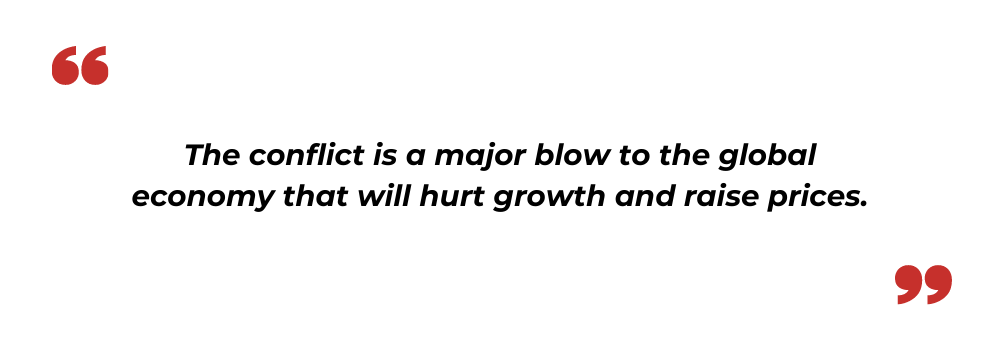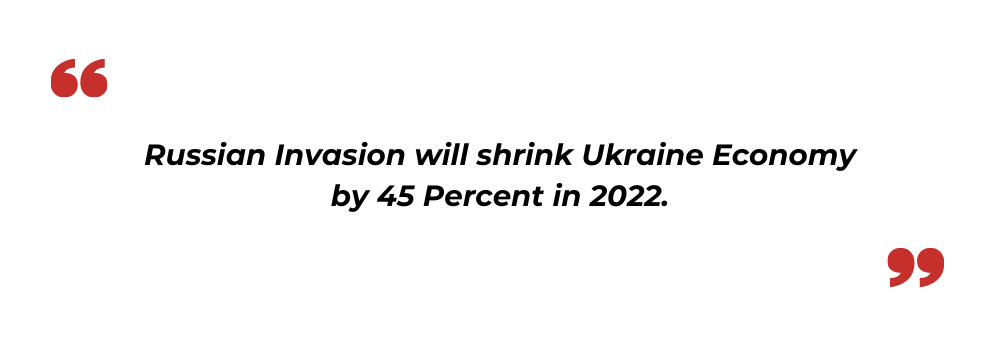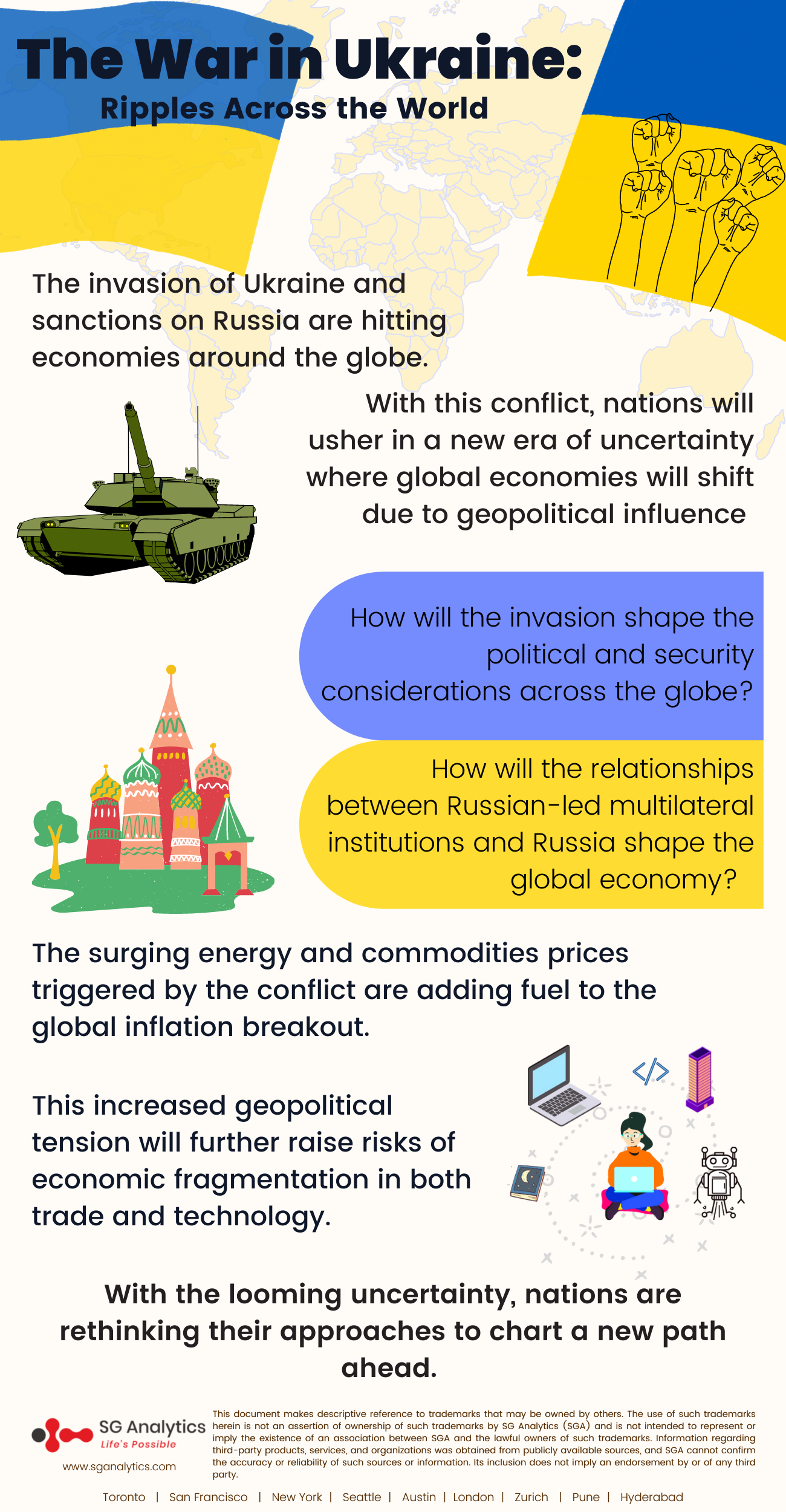The Ukraine war and sanctions imposed on Russia are hitting economies around the globe. Emerging sectors and developing countries in the Europe and Central Asia region are expected to bear the brunt of this conflict. The war has also added to mounting concerns of a sharp global slowdown due to the surging inflation and debt. The economic impact is reverberating through multiple channels, like commodities, financial markets, trade, and migration links.
Among this growing tension, Ukraine’s economy is expected to shrink by an estimated 45.1 percent. The magnitude of this contraction will likely depend on the duration and intensity of the war. Hit by unprecedented sanctions from several countries, Russia’s economy is projected to contract by 11.2 percent in 2022.

The prospect of the Russian invasion of Ukraine has intensified alarm all over, threatening to plunge the economies further into the grips of conflict. With this conflict, nations will usher in a new era of uncertainty where global economies will shift due to geopolitical influence.
How will the invasion shape the political and security considerations across the globe?
How will the relationships between Russian-led multilateral institutions and Russia shape the global economy?
The surging energy and commodities prices triggered by the conflict are adding fuel to the global inflation breakout. With the looming uncertainty, nations are rethinking their approaches to chart a new path ahead.

Global Shocks
The ongoing war and the pandemic have shown that crises can cause widespread economic damage and set back a country's per capita income and development gains by years.
The consequences of the Ukraine war have already shaken not just nations but also regions and the world. Today, we are living in a more shock-prone world, and the time has come to strengthen and face collective deals.
While some consequences may not fully come into focus for years, many sectors are already seeing the clear signs of war. This has resulted in a jump in costs for essential commodities, making it harder for policymakers in certain countries to strike the delicate balance between preventing inflation and supporting the economic recovery after the pandemic.
Read more: The U.S. & the UK Announce Ban on Russian Oil Imports; What is the Future of Global Energy Supply?
Geopolitical Implications for Europe & Asia
The shockwaves from Russia's invasion of Ukraine continue to reverberate across Eurasia. Vulnerable to retaliation and uncertainty arising due to western support, regional powers like Turkey and other smaller regions of the South Caucasus and Central Asia are facing complicated choices.
States that are deeply integrated with Russia due to the western sanctions imposed are facing additional burdens. A steep reduction in Ukraine's forecasted grain harvest and Russia’s decision to ban the export of grain to members of the Eurasian Economic Union have raised anxieties about food security. The influx of both Russian and Ukrainian migrants is creating uncertainties in some regions.
Global Supply Chains are Facing the heat of the invasion
Russia’s invasion of Ukraine has plunged the energy sector into a state of crisis. The soaring energy prices are putting countries in flux. Europe, which ordinarily sources 40% of its gas from Russia, is particularly facing the heat. The surging natural gas price in Europe has increased tenfold increase since the beginning of 2021.
Apart from the soaring energy prices, the rest of the world is also suffering from the ripple effects of Russia’s war. War is sending shockwaves through the global economy, which is intricately intertwined with the global supply chain.
The world experienced severe disruption in the semiconductor sector due to a plethora of factors ranging from shifting demand to labor shortages and Covid-19-related lockdowns. Ukraine is the supplier of more than 90% of the U.S.’s semiconductor-grade neon, a gas critical to the lasers used in the chip-making process. On the other hand, Russia supplies 35% of the U.S.’s palladium, a rare metal used to create semiconductors. The ongoing conflict is now likely to prolong this ongoing semiconductor shortage.

To make things even worse, Russia is considered one of the important producers of several key nutrients in fertilizers, including potash and phosphate. With Russia cutting its exports, a major disruption in the global fertilizer market is likely to follow. Higher oil prices are also leaving their marks on many exports, making them more expensive and more difficult, thus giving rise to the possibility of disruptions to global shipping routes.
The spillover effects of the conflict will be further complicated by human behaviors. Industries are holding their current supply inventories and reaching out to deep-tier suppliers to secure raw materials. Such behavior is likely to send misleading demand signals in the supply chain, encouraging aggressive capacity investment.
The world today is highly interdependent and interconnected. With the rising ripples in the supply chain caused by the current conflict, policymakers and businesses not only are staying alert to the immediate disruption but also thinking holistically to navigate through the impending shocks to the global supply chain.
Read more: Russia-Ukraine Crisis; Global Stocks Plunge; Inflation Risk Looms; What’s Happening?

A World Watching the Repercussions
The acceleration in the shift is causing an enormous jolt in global economies, and the world is now looking for avenues to do something else. Experts across the globe are starting that the reverberations of the Russia-Ukraine incursion and the strength of the Western sanctions are being felt by all. Some fear that the Russian move can chalk up as a victory, thus encouraging other nations to engage in border disputes.
Beyond the despair and humanitarian crisis, the entire global economy is feeling the effects of slower growth and faster inflation. These impacts are flowing through three main channels-
- Increasing prices for commodities like food and energy are further pushing up inflation and eroding the value of incomes and weighing on demand.
- Neighboring economies are grappling with disrupted trade, supply chains, remittances, and the historic surge in refugee flows.
- Reduced business confidence and higher investor uncertainty are weighing on asset prices, thus tightening financial conditions and spurring capital outflows.
With Russia and Ukraine being major commodities producers, the disruptions have caused global prices to soar, specifically for oil and natural gas. Food costs are also jumping, as Ukraine and Russia are 30 percent of global exports for wheat.
Beyond these global spillovers, nations with direct trade, tourism, and financial exposure with Ukraine are also feeling additional pressure. Economies that rely on oil imports are seeing wider fiscal and trade deficits. Due to the rising inflation pressure, some exporters, including the Middle East and Africa, are benefiting from higher prices.
Steeper price increases for food and fuel are leading to the dawn of greater risk and unrest in regions like Sub-Saharan Africa, Latin America, the Caucasus, and Central Asia. This food insecurity is likely to increase in parts of Africa and the Middle East.
In Conclusion
The magnitude of the humanitarian crisis is staggering. The invasion is delivering a massive blow to Ukraine’s economy and has inflicted enormous damage to infrastructure globally.
The war is hitting hard the emerging and developing economies of Europe and Central Asia. The region is heading for an economic slowdown. In addition to Russia and Ukraine, many regions of Belarus, Kyrgyz Republic, Moldova, and Tajikistan are projected to plunge into recession as growth projections have been downgraded in all economies. The spillovers from the war have led to weaker-than-expected growth.
Gauging these reverberations will be hard for institutions across. Considering the longer-term scenario, the war will fundamentally alter the global economic and geopolitical order. With the energy trade shift, supply chain reconfigurations, and payment networks fragment, countries will rethink and revise their current holdings. The increased geopolitical tension will further raise risks of economic fragmentation in both trade and technology.
With offices in New York, San Francisco, Austin, Seattle, Toronto, London, Zurich, Pune, and Hyderabad, SG Analytics, a pioneer in Research and Analytics, offers tailor-made services to enterprises worldwide.
A market leader in Market Research Services, SG Analytics enables organizations to achieve actionable insights into products, technology, customers, competition, and the marketplace to make insight-driven decisions. Contact us today if you are an enterprise looking to make critical data-driven decisions to prompt accelerated growth and breakthrough performance.


